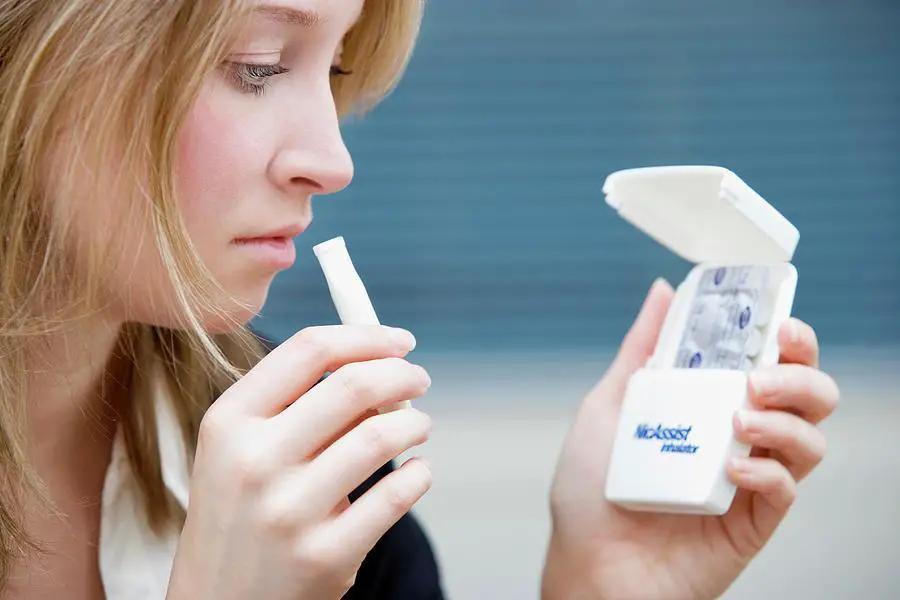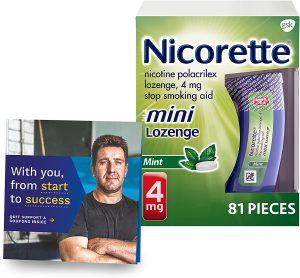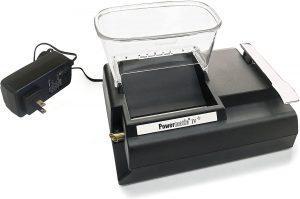Retro Cigarette Rolling Machine,Beautiful Brass Vintage Manual Roller,pure copper joint roller machine,solid brass roller vintage cigarette,rollerfits 70MM Paper,come with brass Tobacco Pipe
$33.88 ($2.12 / Ounce) (as of July 22, 2024 01:04 GMT +00:00 - More infoProduct prices and availability are accurate as of the date/time indicated and are subject to change. Any price and availability information displayed on [relevant Amazon Site(s), as applicable] at the time of purchase will apply to the purchase of this product.)A nicotine inhaler has emerged as an advanced and beneficial device that proves useful and a viable alternative to cigarette smoking. Many smokers struggle with addiction, and to help them quit smoking with fewer harmful effects, companies have developed this brand-new gadget. The nicotine inhaler allows users to control their nicotine intake, enabling them to overcome their cravings gradually. This innovative gadget is designed for those who want to enjoy the smoking experience without consuming tobacco.
Brief History:
In the 1990s, the United States introduced its first nicotine inhaler as a medical prescription. Pharmacia, a company, created this tool for individuals who frequently crave nicotine but wish to avoid its drastic impacts. The nicotine inhaler causes less harm and provides smokers with a satisfying experience without the addition of tobacco.
Read Other Post: Everything you need to know about Blu e-cigarettes.
White Leaf Tobacco & Nicotine Free Smoking Mixture
25 Packs Smoking Deluxe Ultra FIne King Size Rolling Papers. A world best seller. Ultra Thin, slow-burning paper. Contains 33 leaves, Smoking¨ watermarked. 100% natural vegetable gum, with no colourings or other additives.
![]()
- Quit smoking with power of Ayurveda: In the emotional aspect of giving up smoking, An herb-based cigarette
- Tobacco Free, Nicotine Free, Addition Free
- Get over the nicotine addiction with style, good taste and all natural herbs
- 1 packet – 100 Gram / 3.5 Oz
- Made In India Product
Comparison with other Nicotine Replacement Therapies (NRTs):
The nicotine inhaler resembles other NRT tools, such as nicotine sprays, patches, gums, and lozenges. However, it operates on different principles as a nicotine-controlling device. Rather than transferring nicotine directly to the lungs, it allows nicotine absorption in the throat lining. Additionally, these inhalers immediately alleviate nicotine cravings through hand-to-mouth action, which plays a significant psychological role in smoking.
This article will provide comprehensive guidance on nicotine inhalers, including their benefits and side effects. Stay tuned with us until the end.
7 Benefits of using a nicotine inhaler:
Nicotine inhalers are associated with multiple benefits. Here we are going to discuss the major ones.
-
Control the dose of nicotine:
Unlike cigarette smoking, nicotine inhalers allow users to control the amount of nicotine they intake. Nicotine inhalers are specifically designed for heavy smokers who experience nicotine cravings during withdrawal. The controlled amount of nicotine is achieved through the presence of cartridges that come with a fixed quantity of nicotine. In contrast to cigarette smoking, where nicotine strength depends on the nature of tobacco and the method of consumption, inhalers offer a reliable option for smokers to satisfy their cravings without experiencing severe withdrawal effects on the body and brain.
-
Provide a smoking experience:
For smokers, apart from nicotine addiction, the hand-to-mouth motion involved in cigarette smoking holds significant importance, providing a sense of satisfaction and calmness. The nicotine inhaler caters to this experience as well. It features a mouthpiece that users hold and inhale, mimicking the gesture of holding a cigarette. Therefore, it satisfies the psychological factor associated with smoking, enabling the smoker to feel a sense of familiarity.
-
Alleviate cravings:
The primary challenge smokers face when attempting to quit is the immediate satisfaction of nicotine cravings, which many other devices fail to fulfill. However, nicotine inhalers directly deliver nicotine to the bloodstream, rapidly diminishing the urge for tobacco cigarettes. This makes them an excellent tool for heavy smokers who experience more severe withdrawal effects than novices.
-
Less exposure to harmful chemicals:
Unlike cigarettes, the nicotine inhaler releases vapors for the user to inhale, resulting in exposure to fewer chemicals. Cigarettes release tar, carbon monoxide, and various carcinogens, ultimately affecting the lungs and other organs. In contrast, nicotine inhalers do not contain such chemicals, reducing the chances of cardiovascular, lung, and respiratory diseases for the individuals who use them.
Editor’s Pick
Nicorette 4 mg Mini Nicotine Lozenges
![]()
- Mini nicotine lozenges
- 4 mg nicotine strength
- Supports smoking cessation
-
Improved lung function:
By switching from cigarette smoking to nicotine inhalers, individuals are exposed to fewer harmful chemicals, leading to increased efficiency of the lungs over time. Researchers have found that those who use nicotine inhalers after smoking cigarettes have significantly better lung conditions. Cigarette smoking introduces multiple diseases, such as wheezing, coughing, bronchitis, emphysema, and COPD. However, transitioning to a nicotine inhaler gradually improves the health and capacity of the lungs.
-
Aids in smoking cessation:
The nicotine inhaler plays a significant role in helping individuals quit smoking altogether. People using Nicotine Replacement Therapies (NRTs) like nicotine inhalers have double or triple the chances of successfully quitting smoking. Nicotine inhalers provide a safer alternative to smoking with fewer adverse effects. Moreover, they assist in overcoming the withdrawal symptoms associated with smoking cessation.
-
Cost-effectiveness benefits:
In addition to the advantages above, nicotine inhalers appear to be less costly than cigarettes. While the upfront cost of these devices might seem expensive, they provide multiple nicotine doses throughout the day. Furthermore, taxes on these inhalers do not rise dramatically like cigarette packs.
To use this advanced tool effectively, carefully read the following instructions:
Instruction:
Hold the nicotine inhaler in your hand and inhale from its mouthpiece as you would with a cigarette. It also resembles an asthma inhaler, so you will find it familiar. Retain the vapors in your mouth before exhaling, and then exhale slowly. When using it, do not exceed the recommended nicotine strength doses.
Choosing the Right Strength:
Consult healthcare professionals to determine the appropriate nicotine strength. The strength of nicotine varies and depends on your addiction level. If you are a heavy smoker, opt for a high strength. However, if you smoke frequently or have already reduced nicotine intake, you should use a low or mild nicotine strength. Additionally, consult your healthcare provider regularly for guidance.
When to Use It:
We recommend using the inhaler only when you experience cravings or when withdrawal effects become overwhelming. You can also use it as an alternative to cigarette smoking, such as after meals or in the morning. However, we strongly advise against frequent use, as it can lead to nicotine dependency in your body and brain.
Number of Puffs per Day:
Follow the prescription provided by your healthcare professional. Typically, start with 10-15 puffs daily but gradually decrease the quantity. This approach will help you eliminate smoking progressively.
Proper Storage:
Store the inhaler in dry and cool places, avoiding warm and hot environments. Keep it out of reach of children. Replace the cartridge with a new one when it runs out of fluid, as an empty cartridge reduces the inhaler’s effectiveness and may damage it.
Potential Side Effects of Using a Nicotine Inhaler
In addition to serving as a perfect alternative to cigarette smoking, nicotine inhalers also come with multiple side effects. While some of these effects are mild, others can have long-lasting impacts on your body’s internal metabolism. Below, we will discuss the significant side effects:
Common Side Effects:
Consumers commonly experience these side effects, but they are generally less harmful. They include:
- Throat irritation and coughs
- Hiccups
- Headache
- Nausea
- Stomach upset
- Nasal congestion
- Vomiting
- Mouth and throat pain
Although these side effects are common among nicotine inhaler users, they typically subside automatically within a few days without needing medication.
Less common but severe side effects:
These are less common side effects that people may experience after regularly inhaling nicotine inhalers:
- Rapid and irregular heartbeat
- Allergic reactions such as swelling, hives, and difficulty breathing
- Seizures and convulsions
- Symptoms of nicotine overdose include weakness, insomnia, nausea, confusion, and sweating.
If you experience any of the symptoms mentioned above, seek medical treatment from your healthcare professional. Ignoring or neglecting these symptoms can be dangerous to your health.
Editor’s Pick
Powermatic 4+ Electric Cigarette Injector Machine
![]()
- Electric cigarette rolling machine
- Automatic injector
- Simplifies cigarette making
Who should avoid nicotine inhalers:
We recommend that specific individuals should not use nicotine inhalers. These include:
- Individuals under the age of 18.
- Pregnant women or those who are breastfeeding their infants.
- People with cardiovascular problems, high blood pressure, or a history of seizures.
- Individuals allergic to nicotine or other ingredients present in the inhaler should never use it.
Considerations for pregnant and breastfeeding individuals:
Nicotine can cross the placenta and affect fetal development in pregnant women. Therefore, if you are pregnant, it is essential to consult your healthcare professional before using nicotine inhalers. Only use them if the benefits outweigh the risks associated with their use.
Similarly, nicotine can be present in breast milk and mixed with your infant’s milk. Hence, it is important to consider your doctor’s recommendations regarding using nicotine inhalers during breastfeeding.
Read More: Exploring the Controversial World of E-Cigarette Bans.
How do nicotine inhalers help with quitting smoking?
Like other forms of nicotine replacement therapy (NRT), nicotine inhalers aid in smoking cessation by reducing cravings. Here are the ways in which nicotine inhalers help smokers quit:
-
success rate compared to other smoking cessation methods:
Nicotine inhalers are the most effective way to reduce smoking cravings among cigarette addicts. According to a detailed report by the American Cancer Center, nicotine inhalers can increase the chances of smoking cessation by almost 50-70 percent more. However, success also depends on other factors, such as the strength of addiction and the individual’s commitment to quitting smoking.
-
Tips for quitting smoking with a nicotine inhaler:
If you want to use nicotine inhalers purposefully, here are some tips you should follow:
- Use the nicotine inhaler as prescribed by your doctor or healthcare professional.
- Use it when you have an intense craving to smoke.
- Avoid overusing it, as it can increase nicotine dependency.
- Steer clear of triggers that make you crave nicotine inhalers, such as stress and social situations.
- Gradually reduce the number of puffs daily, and you will start feeling more comfortable. Following these tips will help you quit smoking altogether without causing significant damage to your mental and physical health.
-
Combine nicotine inhaler with counseling:
Regular counseling is crucial for maximizing the benefits of nicotine inhalers. Consult a counselor to inform you about specific triggers that intensify your smoking desires. Additionally, healthcare professionals can provide you with a supportive community and assistance in quitting smoking. They will help you understand strategies for smoking cessation and create a relaxed and comfortable environment.
Although nicotine inhalers are beneficial for quitting smoking, they are not magical tools. Quitting smoking is a time-consuming and challenging process. However, with time, individuals learn to control their smoking desires.
Besides consulting guidance, users must know the precautions associated with nicotine inhalers; otherwise, the risks will outweigh the benefits. These precautions include:
Overuse and Nicotine Toxicity: Regular and uncontrolled intake of nicotine inhalers can be toxic to your health. Overuse may result in inconveniences such as vomiting, nausea, allergic reactions, and headaches. If you experience these symptoms, immediately discontinue using the nicotine inhaler and seek appropriate medical attention.
Risk of Addiction: Although nicotine is a better option than cigarette smoking, it is not completely reliable or beneficial for your health. The excessive use of nicotine inhalers can lead to nicotine dependency. Please do not use it against recommendations, as it may result in extreme dependence.
Proper Disposal of Used Inhalers: Dispose of the used nicotine inhalers properly to prevent inhalation by children and pets. Check with the local waste management facility to learn how to dispose of a nicotine inhaler without negatively affecting the surrounding environment.
Frequently Asked Questions:
Q: How do I know which nicotine inhaler strength to use?
A: The appropriate nicotine inhaler strength depends on multiple factors, such as the number of cigarettes you used to smoke per day, the intensity of withdrawal symptoms you are experiencing, and the strength of tobacco you were using previously. If you are smoking 20 cigarettes per day, a 15 mg inhaler is a better option. For fewer than 20 cigarettes per day, a 10 mg nicotine inhaler is recommended.
Q: Does the nicotine inhaler have any flavor options?
A: No, nicotine inhalers do not come in different flavors. They typically consist of a flavorless cartridge with nicotine strengths of 10 mg and 15 mg. This helps users avoid nicotine withdrawal symptoms.
Q: How long does a nicotine inhaler cartridge last?
A: Unlike e-cigarettes, nicotine inhaler cartridges do not last for days or weeks. With regular inhalation for 20 minutes, the cartridge is depleted. The inhaler is intended for short-term use to mitigate smoking withdrawal effects and is not meant for addiction purposes.
Conclusion:
Nicotine inhalers are gaining popularity due to their medical applications. However, excessive use of nicotine inhalers can have negative impacts. This article provides the ultimate guide to nicotine inhalers, including their benefits, side effects, and how they work. We hope this informative article proves helpful to those looking to transition from cigarette smoking to nicotine inhalers. Feel free to share your valuable ideas about nicotine inhalers in the comment section and share them with your community and friends.
















